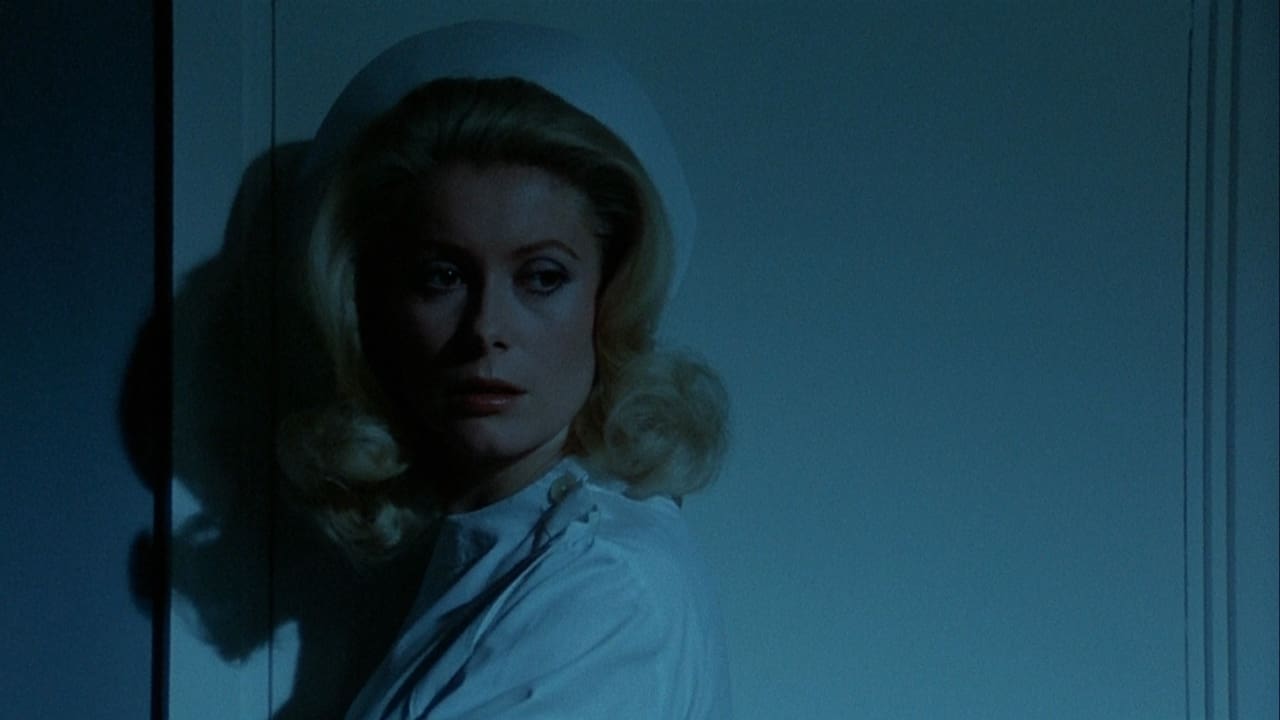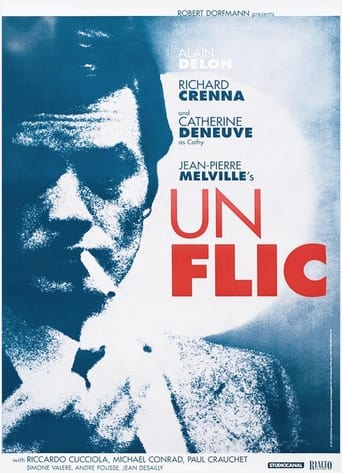

Clever, believable, and super fun to watch. It totally has replay value.
... View MoreThe tone of this movie is interesting -- the stakes are both dramatic and high, but it's balanced with a lot of fun, tongue and cheek dialogue.
... View MoreLet me be very fair here, this is not the best movie in my opinion. But, this movie is fun, it has purpose and is very enjoyable to watch.
... View MoreOne of the film's great tricks is that, for a time, you think it will go down a rabbit hole of unrealistic glorification.
... View MoreFor a police thriller, this movie chose the strange angles of architecture and fashion from which to tell the story. Throughout, the film actively tries to showcase a new, modern France. In the weird opening sequence, we see a sea-side resort with an endless row of brand-new apartment blocks, totally void of human presence in a foul winter-weather. Strangely, from afar, a shop in one of the buildings seem open. Because of the abundant lighting, we might be tempted to think it's a bar, but it's a bank (about to be robbed). The police headquarters is another modern building given lots of camera-attention by Melville, who seems to juxtapose this 'new' France to the old; the contrasts with scenes of the 'old Paris' such as the closing scenes at the Arc de Triomphe are great.The male characters seem to spend an inordinate amount of time to groom their looks. Both Alain Delon and the excellent bad guy Richard Crenna (Simon) are given lengthy shots showing them combing their hair. They parade around in flawless suits, slick ties, lush bathrobes, gold cuff links. These are sharp dressed men, vain and self-obsessed, misogynist and gay-bashing. The gorgeous can-can girls are there (like in so many other Melville movies) but no-one seems to notice them. Delon manipulates a beautiful transvestite into thinking he might fall for her charms, only to beat her up when she fails to deliver on a promise.Catherine Deneuve on the other hand seems less well served, sartorially speaking; I was not very impressed with her acting performance in this film, but perhaps my judgment is influenced by the ugly earrings she wears throughout. The closing titles highlight that the black dress worn by 'Mademoiselle Deneuve' was by Yves Saint Laurent. I don't know why this was pointed out, since the dress is hideous. Deneuve's finest moment was when she plays an angel of death, wearing a haute couture caricature of the nurse uniform. Quentin Tarantino must have been directly inspired by this to create Daryl Hannah's nurse look when she is set to murder Uma Thurman at the start of Kill Bill vol 1.All in all, the plot was not that interesting, but since the male actors were all in terrific form it was a very pleasurable movie to watch.
... View MoreThe moody opening sequence promises so much, the deserted storm-lashed seaside location, the carefully staged bank 'blagging' and the clever escape all bode well, but it's all down hill from there. The rest of this movie stagnates with a lack of pace, a lack of dramatic effect and far to much screen time given over to dreary details : washing faces, tying shoe laces. To make matters worse the big set-piece features a truly dismal special-effects train robbery straight out of THUNDERBIRDS TV series. Instead of keeping this brief and maintaining some suspension of disbelief it goes on and on and on giving the viewer repeated chances to confirm how unconvincing the model vehicles really are. And this is not the only poor piece of studio work; poorly executed painted backdrops feature in several scenes at a time when on-the-streets reality was already the established way to go. The story is confused, several characters seem superfluous and as the lead character, Alan Delon sleepwalks though the movie. There is laconic and there is plain boring, and sadly he's the latter on this occasion. It's a performance that matches the tone of entire film.
... View MoreImmortality followed by death, like Parvulesco said. Rumour has it that Melville was dissatisfied with this film. Can't see why. Not long ago I bought the 6 DVD set of his flicks from 1956 – 1972. All masterful, but this is the one I keep coming back to, and I do think I think of it as a pinnacle of his metier.What does Melville mean by invoking "Ambiguity and Derision" over the opening credits ? It's as though he's talking to himself all through the narrative, from beginning to end. The initial scene is one of the most hypnotic I've ever seen. Charged with palpable, palpitating tension, yet at the same time unnervingly surrealistic --- not Dali, more reminiscent of Magritte or Giorgio de Chirico --- it leaves Hitchcock standing in the suspense stakes.The action begins with the Mystery and Melancholy of a Street. It is virtually certainly the Esplanade de la Mer, on France's Atlantic western coastline, abutting the Bay of Biscay, known throughout history as a stormy quarter of the ocean. That esplanade is near St Jean de Monts, between Brest and Bordeaux, and not far from La Roche-sur-Yon. Nowadays there's a golf course just north of St Jean de Monts. The names of these real places are supplied by the cinematography. Realistic surreality is also supplied, by the vast condominium block, presumably only just completed, in 1971, and still unoccupied. Although there was perhaps one inhabited window.The fag-end of the day's weird financial activity in the corner BNP (not the British Nazi Party, of course) bank-shop is bizarre. Who are these glum people executing enigmatic transactions ? Where do they live ? How did they get to be there on what appears to be one of early January's most miserable afternoons ? It's riveting.Skip now to the sequence on which so many have hanged themselves up. This is the insanely planned and impeccably executed robbery from a suitcase, minded on a moving train by Bagman Matthieu, of a large number of plastic packages filled with a powdery white substance. All film plots are completely phony, riddled with holes, but except for here, they fake reality. Melville, however, is deliberately saying that he knows you ought to know it's completely ridiculous: take a good, long, very long look at the dinky toys, the Hornby train set, the plastic manikin. Verfremdungseffekt, as one perceptive commentator puts it. Why ? But then, why not ? It's just a movie. Think about it. Flickering images in two dimensions.What a phenomenal masterpiece this film is. You can see it must be, when you read the numerous failed reviews. Here's something for chewing on: "By disclosing and making obvious the manipulative contrivances and 'fictive' qualities of the medium, the viewer is alienated from any passive acceptance and enjoyment of the action as mere 'entertainment.' Instead, the viewer is forced into a critical, analytical frame of mind that serves to disabuse him of the notion that what he is watching is necessarily an inviolable, self-contained narrative. This effect of making the familiar strange serves a didactic function insofar as it teaches the viewer not to take the style and content for granted, since the medium itself is highly constructed and contingent upon many cultural and economic conditions." Why use five words, when fifty will do ?
... View MoreWhen this film first began, I was pretty pleased. I loved the dialog and the look of the crooks (with trench coats and fedora hats)--it was almost like a late 40s-50s example of film noir but in color. It's obvious that director Melville was trying to copy, to an extent, this retro look and style.If you are an American, the first thing you'll probably notice apart from some noir touches is that two of the gang members in this film are American actors whose lines are all dubbed into French. Richard Crenna and Michael Conrad (from "Hill Street Blues") have major parts in the film. This isn't super surprising as it was pretty common in Europe for studios to use American actors and dub their lines--especially in Italian films. My assumption is that the American actors' star power helped ticket sales, though in some of these cases the actors did NOT contribute well to the film. In some cases this is because the dubbing was done very poorly--fortunately, in this film it's pretty good.The film consists of showing the crime and investigation from two alternating views--the crooks and the cop (Alain Delon). The film bounces back and forth quite often but manages to do this effectively. The caper is a bank robbery in which one of the gang members is shot. However, it's clear they are professionals and they've taken a lot of steps to cover their tracks and effectively hide the loot. Interestingly, however, there turn out to be a few twists. First, the initial robbery was not THE big score in the film--this would come later. Second, while the scene made little sense (why sneak into a hospital to kill a guy you could have killed much easier before YOU dropped him off at the hospital in the first place?!), it was an wild twist to see how the handled the gang member who was shot. This scene with the beautiful Catherine Deneuve was quite shocking...and effective. Third, Delon's role turns out to intersect with the gang in a way you might not expect.Unfortunately, while the film is handled very well in most ways and shows how wonderfully you can make a film with such economy of language (there is VERY little dialog in the film), a major problem in the movie starts at the 53 minute point. The action switches to a train and you see one of the sloppiest uses of models I've seen since the last time I watched a Godzilla film! It looks just a kid's HO-gauge train set and a cheap helicopter model---which is exactly what they must be! Pretty sloppy. What also bothers me about this is that I noticed some score of 10 among the reviews. How can you give a film a 10 with such sloppy effects? I don't expect mega-million dollar effects, but this was just botched badly and looks bad...and a 10 would seem to imply perfection or at least near-perfection. Plus, plot-wise, don't you think someone on the train would have noticed a helicopter hovering just a few yards above the train for so long?! Fortunately, following these dumb scenes the film DID get better! Up until the silly scenes, I might have given this film a 9. However, considering how many scenes were done with crappy looking models, I think a fair overall score is 7 as it still held my interest. Pretty good and with a lot of potential to be a lot better--unfortunately, it's not among Melville's best though it turned out to be his last.
... View More